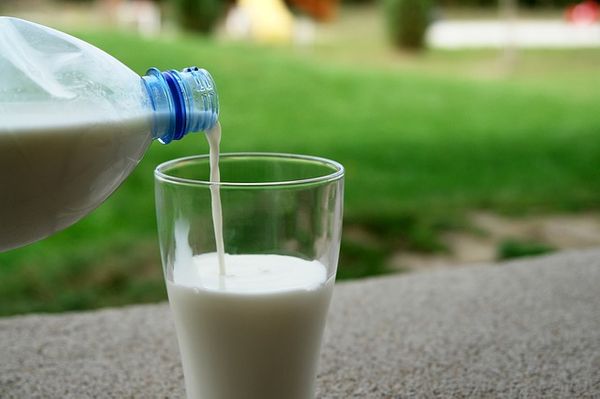Goat milk is a dairy product that has been enjoyed for centuries and is an alternative to cow’s milk. It is sourced from domesticated goats, primarily of the Capra aegagrus hircus species. Goat milk shares many similarities with cow’s milk but also has some unique characteristics.
Health Benefits of Goat Milk
Goat Milk Unlike Cow Milk Prevents Allergic Reactions
Goat milk can help prevent allergic reactions when compared to cow’s milk, which is a known allergen. Cow’s milk is a common cause of allergies, and these allergies, often originating in childhood, can persist into adulthood. The culprit behind these allergic reactions can be attributed to the presence of approximately 20 different allergens in cow’s milk.

Goat Milk Contains the A2 Protein
When it comes to protein composition, goat’s milk shares a similarity with human breast milk as it primarily contains “A2 casein.” Importantly, A2 casein does not trigger inflammatory conditions like colitis or irritable bowel syndrome. A study has indicated that infants introduced to goat’s milk as their initial protein source after breastfeeding experienced fewer allergic reactions compared to those introduced to cow’s milk.
Goat Milk Lowers Bad Cholesterol Levels
Goat milk typically contains less saturated fat compared to cow’s milk. Diets high in saturated fat are associated with elevated LDL cholesterol levels. By choosing goat milk as a lower-saturated fat option, it can contribute to better heart health. The milk contains a favorable balance of fatty acids, including a higher proportion of unsaturated fats. Unsaturated fats, particularly monounsaturated fats and polyunsaturated fats, have been linked to lower LDL cholesterol levels and improved cardiovascular health.
Some studies suggest that goat milk may have higher levels of conjugated linoleic acid (CLA), a type of fatty acid with potential heart-healthy effects. CLA has been associated with improved cholesterol profiles, including a reduction in LDL cholesterol. (Source)
Also Read: Know 10 Natural Ways to Lower Your Cholesterol Now
Goat Milk Has Tremendous Benefits Of Skin
Goat milk is naturally rich in fats and proteins, making it an excellent natural moisturizer. It helps hydrate and soften the skin, making it especially beneficial for individuals with dry or sensitive skin. It contains vitamins A and D, both of which are known to promote healthy skin. Vitamin A supports skin cell renewal, while vitamin D contributes to overall skin health.
Goat milk contains alpha hydroxy acids (AHAs), such as lactic acid. These AHAs can exfoliate the skin, remove dead skin cells, and promote a more radiant complexion. The minerals in goat milk, such as selenium, zinc, and copper, have antioxidant properties that help protect the skin from damage caused by free radicals. This can contribute to a youthful appearance and prevent premature aging.

Goat Milk Is Good For The Digestive System
Goat milk primarily contains A2 casein, a protein that some people find less likely to trigger digestive discomfort or symptoms like bloating and gas when compared to the more common A1 casein found in cow’s milk. Goat milk is higher in medium-chain fatty acids (MCFAs) compared to cow’s milk. MCFAs are easier for the body to break down and absorb, potentially benefiting individuals with compromised digestive systems.
Goat milk contains bioactive compounds, such as oligosaccharides, which can have prebiotic properties. Prebiotics promote the growth of beneficial gut bacteria, which is important for a healthy digestive system.
Also Watch: The Top 10 Fitness Trends of 2024
Goat Milk: An Alternative for Lactose Intolerant Individuals
Goat milk is often considered a potential option for individuals who are lactose intolerant. This is because goat milk contains less lactose than cow’s milk, and some people with mild lactose intolerance find it easier to digest. However, it’s important to note that goat milk still contains lactose, so it may not be suitable for individuals with severe lactose intolerance. It’s advisable for those with lactose intolerance to try small amounts of goat milk to assess their tolerance and consult with a healthcare provider for personalized dietary recommendations.
Nutrition And Nutritional Values Of Goat Milk
According to the National Nutrient Database of the United States Department of Agriculture, 100g of Goat Milk has the following nutrients (USDA). (Source)
- Total Fat 4.14g
- Saturated Fat 2.667g
- Trans Fat-
- Polyunsaturated Fat0.149g
- Monounsaturated Fat1.109g
- Cholesterol 11mg
- Sodium 50mg
- Total Carbohydrate 4.45g
- Sugars 4.45g
- Protein 3.56g
- Calcium 134mg
- Potassium 204mg
- Vitamin A57mcg
- Vitamin C1.3mg
Goat Milk: Not-So-Healthy and Healthy Facts
In life, most things have both their advantages and disadvantages, and goat milk is no exception. It’s not recommended to immediately transition your child to goat milk once they’ve stopped nursing. As they grow, the nutritional benefits of goat milk become more suitable, but for optimal growth and health, starting with cow’s milk is generally advisable.
Additionally, it’s worth noting that goat’s milk can be notably more expensive than cow’s milk due to its relatively lower availability, which can strain your budget. Finding raw goat milk, considered the healthiest option, may also pose a challenge outside of health food stores and farmers’ markets.
Also, explore articles about the health and nutrition of other Dairy Products on Health Views Online, a health blog on everything related to healthcare.





